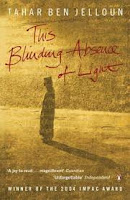A group of soldiers were put on a truck and was driven to the palace of the King Hassan II, on the 10th of July 1971 on an attempt to topple the King and seize power. However, the coup failed , leaving around 200 death that included the rebel leaders, but the King survived. Forces loyal to the King, gathered those responsible for the coup and put them to Kentira, where they were subjected to torture. The leaders ( and many others) were executed, and remaining soldiers were sent to a secret prison, hidden underground in the desert, which was called Tazmamart. It took a long time for the world to know about the existence of this hellhole and many more years for the remaining prisoners to be released, but not before the traces of the prison was erased by the authorities. Those survived, opened up to the world ( western world) and the stories of one of the most dreaded prisons are thus known to the rest of the world.
Tahar Ben Jelloun, uses this page from Moroccan history to rebuild the story of human condition at Tazmamart, through this intense and powerful novel ( loosely based on Aziz Binebine , who was sentenced 20 yrs after participating in the attempted coup). Blindfolded from Kentira, Salim and his friends ( 58 of them in various jails and 20 of them in his prison) were taken to the Tazmamart. In an underground cell, with no light and a small hole to get the air and another for food, they were put in isolated cells of 10ft x 5ft x 5ft. A height of 5ft to prevent the prisoner from standing up.
In a cell, in darkness, where one can not even stand straight, in the company of cockroaches and scorpions, fed just enough to keep them alive, with only possible way to communicate was through the brick walls. The prisoners, resigned to fate, with deranged spirit and bruised body. Though not religious when they were brought in most of the prisoners turns to faith , calling Allah for help and reciting from Qu'ran, to pass their days through. The only time the prisoners are shown light is when they were asked to dig the grave for one of their fellow prisoner who died. As one after the other perishes within the walls of their solitary cells, the rest have to make the place their home with the hope of freedom. The world do not know about their whereabout as the secret underground prison is away from the eyes of the rest of the world. One after other perish as the years go by one to gangrene, another to scorpions, to cholera, by refusing to eat and thereby deciding to end it all or by just giving up the hope, Salim has to keep the rest of them alive. Its his stories, the poems of Moroccan writers and Karim maintains a clock within himself, Ustad sings verses from Qu'ran, and another the anecdotes from the movies he watched and they play imaginary card games. It's their collective survival tactic against the omnipresent death.The occasional visitors, the birds, whose language Salim, decoded and started having meaningful conversations, the slimy cockroaches, the rare moments of openness from the guard ( only to help those who are suffering, or to confirm the death of a colleague who stopped responding to the calls and not giving any signals of life).
Very gloomy, very despairing story of hope and survival, yet never loosing the narrative control to make it a melodrama. Tahar Ben Jelloun at no point attempt to glorify the sufferings, nor trying to make a judgement over the affair. The words and sentences are used carefully, which are often poetic. Which is why, despite being a story of such nature, the pages fly smoothly, and the reader never suffers from the premise that the novel is set in. Despite the possible 'triumph of the human spirit against adversity' kind of tab, the writer check the overflow of emotions cleverly.
Herta Muller's Russian Labour Camp story 'Hunger Angel' is still fresh in mind and I generally thought that was a good piece of writing about the times in a labour camp and detention centers. There was comparisons of the same to "One Day in the Life of...". However, this 'prison story' by Tahar Bel Jelloun, stands tall amongst the rest, if not a notch higher. Beautifully composed, yet extremely powerful tale of survival from one of the worst detention cells in the history of human kind.
--------------------------------------This Blinding Absence of Light ( 2001 )
Tahar Ben Jelloun ( translated from French by Linda Coverdale 2002 )
Penguin Books
195 Pages
-----------------------------------------
Guardian, Wiki













